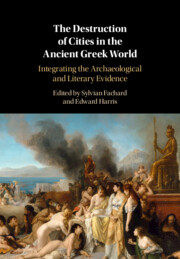 The Destruction of Cities in the Ancient Greek World
The Destruction of Cities in the Ancient Greek World Book contents
- The Destruction of Cities in the Ancient Greek World
- The Destruction of Cities in the Ancient Greek World
- Copyright page
- Dedication
- Contents
- Figures
- Tables
- Contributors
- Preface
- One Introduction
- Two Destruction, Abandonment, Reoccupation
- Three Miletus after the Disaster of 494 B.C.
- Four The Persian Destruction of Athens
- Five The Carthaginian Conquest and Destruction of Selinus in 409 B.C.
- Six Ancient Methone (354 B.C.)
- Seven The Destruction of Cities in Northern Greece during the Classical and Hellenistic Periods
- Eight Eretria’s “Destructions” during the Hellenistic Period and Their Impact on the City’s Development
- Nine Rhodes Circa 227 B.C.
- Ten Destruction, Survival and Colonisation
- Eleven From the Destruction of Corinth to Colonia Laus Iulia Corinthiensis
- Twelve Sulla and the Siege of Athens
- Thirteen The Herulian Invasion in Athens (A.D. 267)
- Fourteen Epilogue
- Index
- References
Thirteen - The Herulian Invasion in Athens (A.D. 267)
The Archaeological Evidence
Published online by Cambridge University Press: 09 September 2021
- The Destruction of Cities in the Ancient Greek World
- The Destruction of Cities in the Ancient Greek World
- Copyright page
- Dedication
- Contents
- Figures
- Tables
- Contributors
- Preface
- One Introduction
- Two Destruction, Abandonment, Reoccupation
- Three Miletus after the Disaster of 494 B.C.
- Four The Persian Destruction of Athens
- Five The Carthaginian Conquest and Destruction of Selinus in 409 B.C.
- Six Ancient Methone (354 B.C.)
- Seven The Destruction of Cities in Northern Greece during the Classical and Hellenistic Periods
- Eight Eretria’s “Destructions” during the Hellenistic Period and Their Impact on the City’s Development
- Nine Rhodes Circa 227 B.C.
- Ten Destruction, Survival and Colonisation
- Eleven From the Destruction of Corinth to Colonia Laus Iulia Corinthiensis
- Twelve Sulla and the Siege of Athens
- Thirteen The Herulian Invasion in Athens (A.D. 267)
- Fourteen Epilogue
- Index
- References
Summary
Using the most up-to-date archaeological evidence, this chapter studies the sack of Athens by the Heruli in A.D. 267 and the city’s subsequent recovery.
Keywords
- Type
- Chapter
- Information
- The Destruction of Cities in the Ancient Greek WorldIntegrating the Archaeological and Literary Evidence, pp. 319 - 339Publisher: Cambridge University PressPrint publication year: 2021
